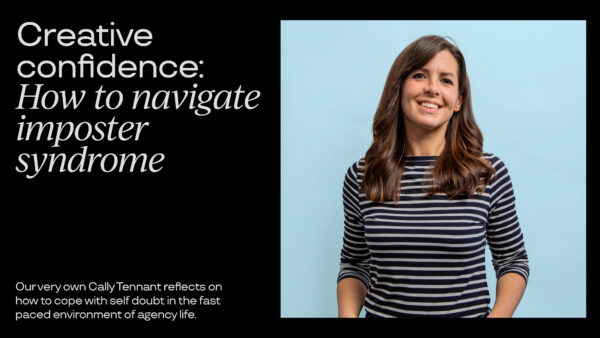
Creative confidence: How to navigate imposter syndrome

Life in the agency world can be both exhilarating and demanding. The fast-paced environment, tight deadlines, and the need to constantly innovate can really pile on the pressure.
Through all this, many creative industry folk find themselves battling self-doubt, which can be quite an isolating thing. And the more isolated you feel, the worse it gets. But this feeling is something everyone feels, at least sometimes. It’s really, really normal and nothing to be ashamed of. And, most importantly, you’re not alone. In fact 62% of UK adults felt they had experienced self doubt in the last 12 months
Self-doubt is such a common human experience. It’s that nagging feeling that you’re not good enough or capable of meeting the expectations placed upon you. Professionally, it can manifest as uncertainty about your skills or your ability to handle work. You may even doubt your place within a team and question your own worth. Interestingly, although it can be felt across all industries, creative arts is hit hard, with a whopping 87% of people in this field affected.
Ramp that up a notch and it turns into full on imposter syndrome – an even more intense form of self-doubt. A deep fear of being exposed as a fraud, despite being totally competent and skilled at what you’re doing.
There are so many theories as to why we experience self doubt and imposter syndrome. How we were raised, the educational system we were a part of and peer/social groups may all play a role. But whatever the reason is that it exists, there are steps we can take to process and address these feelings so they don’t hinder our professional development and emotional wellbeing.
Acknowledge your feelings – being aware and accepting that you are having these feelings is a big step. These thoughts are normal, lots of other people are feeling the same way, right at this very moment. Its natural to have negative thoughts as well as positive ones, but potentially that’s all they are – thoughts – not necessarily facts. If we really focus on these feelings and consider them as purely that, it can help to overcome them.
Talk about it – sometimes just saying things aloud and sharing with someone you trust can change the way it makes you feel and enable you to gain a new perspective. Vocalising is a great way to put all the pieces of a thought together as you have to collate it so that it makes sense to someone else – that can help it make more sense to you and feel less overwhelming.
Record and celebrate your wins – start to document your successes, no matter how small. How many times have you assumed something would be a disaster but its turned out really well? This is proof that you’re totally capable. Start to build yourself a little portfolio of achievement and take a look when you’re feeling down on yourself.
Learn and grow – if you feel like you’re failing, consider what knowledge might help you to succeed. What training or research could you do that would empower you and give you more confidence to face challenges? There’s nothing like learning for finding new enthusiasm and drive. Maybe you can even teach others a thing or two.
Be kind to yourself – You’re not expected to know everything – Nobody knows everything and nobody is perfect! Asking questions, being curious and making mistakes are all great ways to learn and grow. None of it means you’re failing as a person.
It’s not easy to accept the notion of getting things wrong as a good thing, and it’s even harder to reform the opinions that we’ve built up of ourselves over time. But maybe it helps to think that other people are thinking the exact same things about themselves. Even some ‘big shot CEO’s’ have these moments (I like to think so anyway).
Self doubt is normal and we can still work with it.